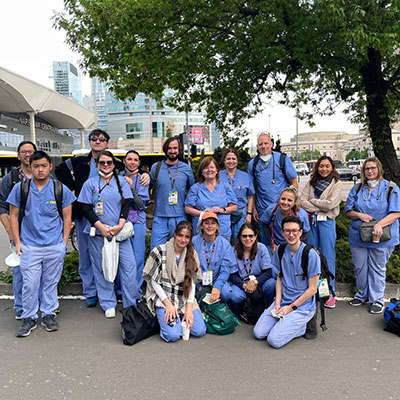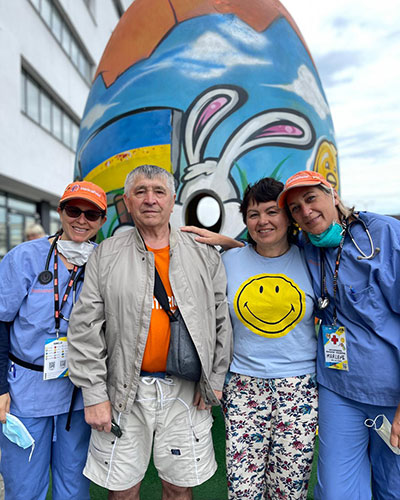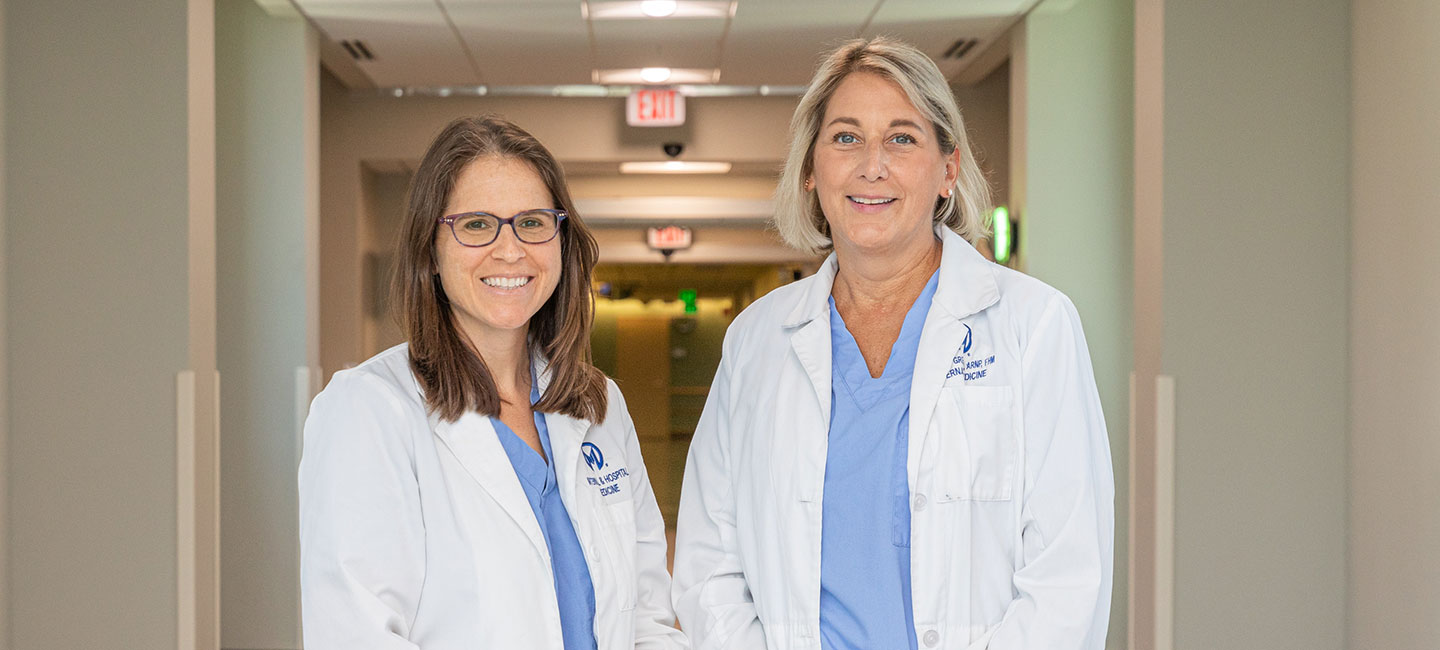Worlds Away, Moffitt Nurses Bring Care to Refugees
Marlene Grenier and Deirdre Sweeney took a look around the shelter in Warsaw, Poland. Thousands were packed in, some there for days, some for months, and many needed medical attention.
“Everything was shocking. It was literally like someone punched you in the chest when you walked into the shelter for the first time,” Grenier said. “The magnitude of everything was just unbelievable.”
“The sights and the smells, I will never forget that smell,” Sweeney said.

Grenier and Sweeney (front row center) worked with Polish doctors and other nurses to treat Ukrainian refugees.
The women, both nurse practitioners in Moffitt’s Internal Medicine Department, spent five days in May treating Ukrainian refugees at a shelter in Poland. Sweeney helped Afghan refugees at a military base in New Jersey last year and Grenier has been part of international mission trips in the past. Both felt a calling to use their skills and resources to help others, but this time, it felt different.
“My previous medical trips had been to impoverished areas with poor access to health care where the people don’t know what they are lacking and you go in and add something extra,” Grenier said. “But the people we took care of from Ukraine had lives very much like our own. These people were literally plucked out of their lives with nothing.”
According to the United Nations, at least 12 million people have fled their homes since Russia’s invasion of Ukraine. Many come through shelters like the one Sweeney and Grenier volunteered at while waiting for visas or to travel to meet family members in other countries.
Licensed under a Polish doctor, the nurse practitioners worked back-to-back days at the shelter, treating refugees for things like respiratory viruses such as COVID-19 and the flu and any wounds or injuries from the war. Many Ukrainians left home with small amounts of medication, so the women also filled medications for those with chronic diseases such as diabetes and heart disease. They worked with a translator to communicate with patients and identify the proper medications in the makeshift pharmacy.
“We had medications donated from Spain, Italy, the UK, Ukraine, Poland, Russia, America,” Sweeney said. “We would spend a lot of time working with the translators to translate them into English or the English equivalent.”
“You had to make do with what you had, so if what you want isn’t what they had, you would have to figure out an alternative,” Grenier said.
Despite the language barrier, Grenier and Sweeney were able to build relationships with some of the refugees: a woman with breast cancer, a mother who had to leave her young son and husband behind to fight in the war, an older couple who came by every day to say hello before leaving for Prague.

Sweeney and Grenier connected with a Ukrainian couple who stayed in their shelter before moving to Prague.
“Deirdre and I helped them back and we both bawled the entire time because packing for them was putting what few belongings they had in a little bag,” Grenier said. “Imagine you left home and everything you own is just gone.”
While there was a strict no photography rule inside the shelter, the trip leader allowed the women to take a photo with the couple before they left.
“She was smiling, but he looks terrified,” Sweeney said. “He doesn’t know what the future holds and you could see it.”
“You’re getting on a bus and a train and going to Prague and you probably have no idea what the rest of their life looks like,” Grenier continued.
Now back home, Grenier and Sweeney say they have a new perspective when it comes to their lives and work at Moffitt. While a large amount of their patients is very sick, the nurse practitioners now have even more appreciation for access to resources and care.
“People in this country have no idea how good we have it,” Grenier said.
Grenier and Sweeney are now planning to return to Poland. While it’s disappointing the war is still going on and help is still needed, they are proud to have another opportunity to make a difference.
And while they are the ones there to help, the refugees are the ones teaching them life lessons they will always carry with them.
“Everyone there was just so resilient and so appreciative. No one was angry, even though they had every right to be,” Sweeney said.



